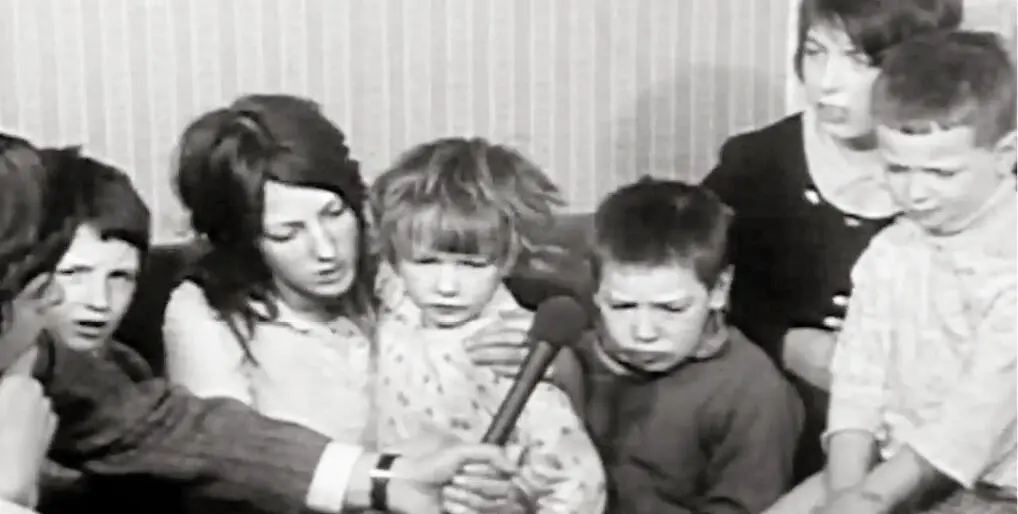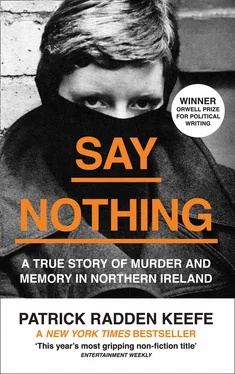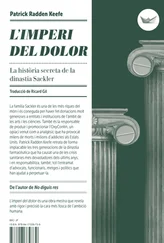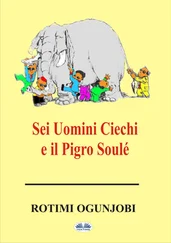The Unknowns did not fit neatly into the regimented organisational chart of the Provos. Instead, they answered directly to Gerry Adams. Brendan Hughes came to think of them as ‘head hunters’, a handpicked team that did dangerous, secretive, sometimes unsavoury work. McClure was soft-spoken and enigmatic. He didn’t socialise with his soldiers; he had a family, and an air of responsibility about him, but he looked out for the people on his team. One winter night, a major gun battle broke out in Ballymurphy, and some of his young volunteers grabbed their weapons and announced that they were going to join the fight. ‘No, you’re not,’ McClure told them. The British soldiers had been trained to shoot at night, but the volunteers hadn’t, he pointed out. ‘You’ll be shooting at newspapers blowing in the street,’ he said. ‘If they take the gloves off, you have no idea. They’ll wipe you out.’ The members of the Unknowns were taken to the country for special training. They stayed in a remote farmhouse and did drills in which they clambered through a river while an instructor fired live rounds into the water around them.
The responsibility for transporting Joe Lynskey across the border to his court-martial and likely execution fell to the Unknowns, and to one member of the unit in particular: Dolours Price. She had joined the Unknowns with her friend Hugh Feeney, the bespectacled pub owner’s son. Marian Price joined, too. Though the ceasefire that summer had lasted only a couple of weeks, Dolours had enjoyed the respite from violence. There was a festive, giddy quality to those days: soldiers walked around without flak jackets; local children took rides in their Land Rovers. Dolours derived a certain mischievous satisfaction from flirting with the troops. Once, the soldiers, with their berets, asked her to pose for a photo with them, and she obliged. There was one British officer, Ian Corden-Lloyd, who would come to the house in Andersonstown and chat with her. He must have known, or at least suspected, that she was a member of the IRA, but they would argue amiably about politics as if they were a couple of graduate students, rather than adversaries in a bloody guerrilla war. At one point, Corden-Lloyd told her that he would love to come back and see her in ten years’ time, ‘and we could all tell each other the whole truth’.
Traditionally, the IRA killed as an example: murdering a traitor in a public fashion was a means of reinforcing social norms. But in the case of Joe Lynskey, the Provos would break that tradition. At a certain point, Lynskey simply disappeared. No announcement was made about the verdict of his court-martial. No body was dumped on the street. Nor, indeed, was any explanation ever offered to the Provo rank and file about the true attacker of Joe Russell, or the sordid backstory of the shooting at the Cracked Cup. Nobody said a word.
Because Lynskey’s work often took him away for long stretches, when he initially vanished, in August 1972, his family did not realise that anything was amiss. A rumour took hold that he was in America – that he had gone to start a new life, as many people during those days did. This was a deliberate campaign of misinformation. At one point, a nephew of Lynskey’s was in New York and met a local Irish republican who told him, ‘You just missed Joe. He was here the other week.’ When Lynskey’s mother died, three years later, she believed that her son must be alive and well and living in the United States.
By that time, he was already long dead. In a twist that represented either a small kindness or a terrible cruelty, when death came for Joe Lynskey, it was in the person of a friend. Dolours Price arrived at Lynskey’s sister’s house to take him across the border. She did not tell Lynskey that he was being summoned to his execution. She said there was a meeting in the Republic that he needed to attend.
Lynskey descended the stairs, freshly bathed and shaven and clutching an overnight bag, as if he were leaving for a weekend in the country. They got into the car and drove south towards the Republic. Lynskey did not say anything much, but Price realised that he knew exactly where they were going. It was just the two of them in the car. He was stronger than she was; he could have overpowered her. But instead he sat there meekly, holding his little bag in his lap. At one point, he tried to explain to her what had happened, and she said, ‘I don’t want to know, Joe. I don’t want to know. I just have this very difficult thing to do.’
He was sitting in the back seat, and she looked at him in the rearview mirror. I’ll take him to the ferry , she thought. I’ll take him to the ferry and say he ran off . He could escape to England and never come back. But instead she kept driving. Why doesn’t he jump out of the car? she wondered. Why doesn’t he smack me on the head and run away? Why doesn’t he do something to save himself? But as she drove on, she realised that he could not act to save himself for the same reason that she could not act to save him. Their dedication to the movement would not allow it. She had vowed to obey all orders, and Lynskey, it seemed, had chosen to accept his fate.
When they arrived in County Monaghan, just across the border, a group of men were waiting for them under a lamp post. Lynskey thanked her for driving him and told her not to worry. He reached out and shook her hand.
‘I’ll be seeing you Joe,’ Price said. But she knew that she wouldn’t be, and she cried the whole way home.
9
One day in January 1973, a television crew from the BBC arrived at St Jude’s Walk. They were looking for the McConville children. Jean had been gone for more than a month. The local press had become aware of the story after an initial article was published in the newsletter of the Northern Ireland Civil Rights Association. Under the headline WHERE IS JEAN MCCONVILLE, the article described how the widowed mother of ten had been missing since 7 December, ‘when she was unceremoniously removed from her home’. Picking up on that original item, the Belfast Telegraph ran a short article on 16 January, ‘SNATCHED MOTHER MISSING A MONTH’, which noted that none of the children had reported the abduction of their mother to the police. The next day, the paper appealed for help in solving the ‘mystery disappearance’.
The BBC crew discovered Helen and the younger children living alone in the flat. After the cameras had been set up, the children sat huddled on the sofa, framed by a backdrop of striped yellow wallpaper, and described their ordeal. ‘Four young girls come into the kitchen. They ordered all the kids up the stairs and they just walked in and took my mummy,’ Agnes said quietly. ‘Mummy walked out in the hall, she put on her coat and left.’
‘What did your mummy say when she left?’ the interviewer asked.
‘She had a big squeal,’ Agnes said.
‘Do you know why your mummy was taken away?’
They didn’t. Helen was a lovely-looking teenager, with the same pale and narrow face as her mother, her dark hair swept to either side. She sat with Billy on her lap and nervously averted her eyes from the camera. The boys were fair and ginger. Tucker was sitting on Agnes’s lap, wearing a blue turtleneck and shorts, though it was the dead of winter, revealing his knobbly knees. The kids were twitchy, their eyes roving all over the place. Michael sat to Helen’s side, nearly cut out of the shot. He stared at the camera, blinking.

Michael, Helen, Billy, Jim, Agnes and Tucker McConville (Still from BBC Northern Ireland news footage, January 1973)
Читать дальше













![Helen Rowland - The Widow [To Say Nothing of the Man]](/books/752764/helen-rowland-the-widow-to-say-nothing-of-the-man-thumb.webp)